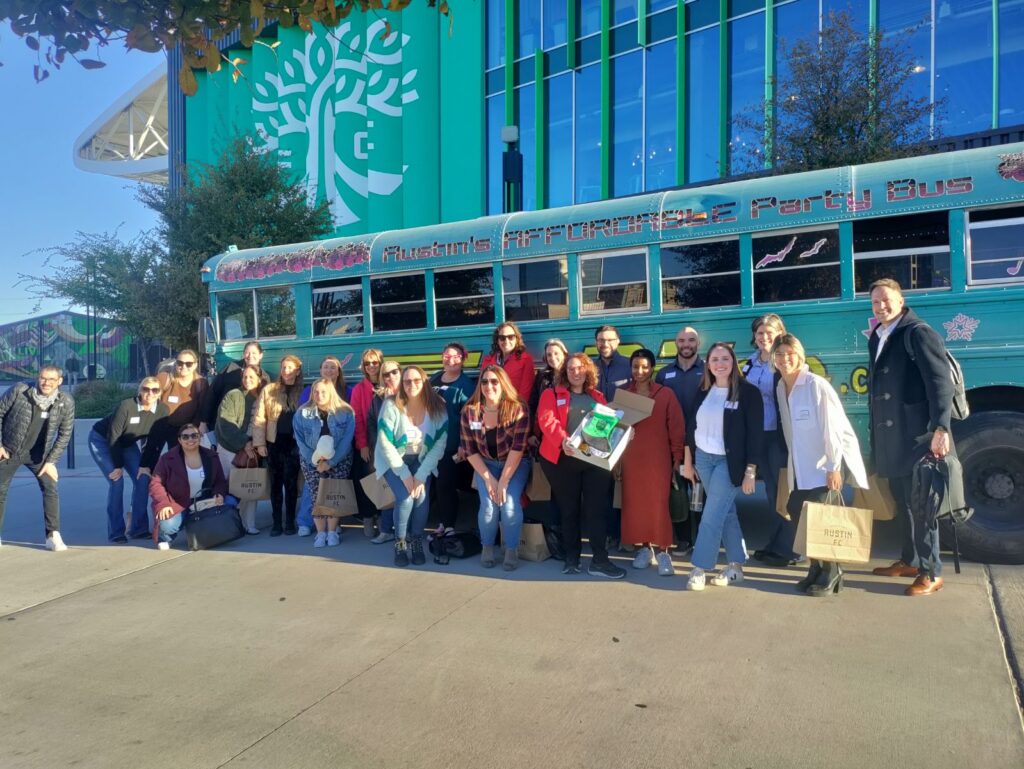Virtual events are a great way to reach a global audience and without the need for the physical requirements of a typical in-person event (like venue booking, catering, and health & safety protocols). If you haven’t hosted a virtual event before, you may be left wondering: are virtual events right for our organization?
In this article, we’ll cover some top statistics about virtual events that you should know about when planning an online event. Learn about the popularity of virtual events, key performance indicators, and more. Here’s an overview of all the categories of virtual event statistics we’ll cover:
- Statistics On The Popularity Of Virtual Events
- Statistics Comparing Virtual & In-person Events
- Event Promotion Statistics
- Event Programming Statistics
- Challenges Faced by Organizers and Presenters
- Sponsorship, Revenue, and Event ROI Stats
- Audience Engagement & Interaction Statistics
- Statistics On Attendee Perspective
- Statistics On Key Metrics For Event Success
- Statistics On Use Of Event Technology
- Other Key Insights For Successful Virtual Event Hosting
Let’s kick things off starting with statistics focused on virtual event popularity.
Statistics On The Popularity Of Virtual Events
Virtual events are becoming more and more common as time goes on. This first set of online event statistics tells us just how popular virtual events are, as well as where that will lead us in the future.
Event organizers are looking to invest more in virtual events
More than half of event organizers plan to invest more money into virtual events in 2021.
(Source: Markletic)
Many events went virtual out of necessity
In 2020, 60% of those hosting live events changed their in-person event to a virtual one because of COVID-19.
(Source: Bizzabo)
Double the events, double the fun
Throughout 2020, the number of organizations that said they were planning to host virtual events doubled.
(Source: Wild Apricot)
Many organizations host multiple virtual events per year
Of event hosting organizations surveyed, nearly half (49%) say they organize 20-30 virtual events annually.
(Source: Markletic)
Organizations expect to invest more in virtual events
The majority of hosting organizations (58%) expect to increase their spending on online experiences in the next year.
(Source: AnyRoad)
Statistics Comparing Virtual & In-Person Events
While virtual events are gaining popularity, do they provide the same experience or benefits as in-person events? The following statistics will compare digital events to in-person events.
Many organizations are pivoting to virtual events
63% of surveyed hosting organizations are switching to hosting exclusively virtual events, rather than in-person events.
(Source: Topo)
Virtual events provide greater reach
Over 80% of event marketers say that the most positive impact they’ve observed from switching to virtual events is greater audience reach.
(Source: Bizzabo)
Most event professionals still think in-person events are best
Nearly all event professionals surveyed (96%) think that virtual events, despite their massive popularity, will not fully replace in-person events in a post-COVID world.
(Source: Bizzabo)
Attendance at virtual events may be higher or lower than in-person events
Almost half of the event organizers (47%) said they had fewer attendees at their virtual events than in-person events, but over one-third of respondents (34%) said they saw more attendees at their virtual events. This variance may be due to how organizations are marketing their virtual events to potential attendees.
(Source: Wild Apricot)
Event Promotion Statistics
To have a successful event, you need to get audience members registered! What event promotion tactics are most effective? How long before the event should you start marketing? These statistics will answer those questions and more.
Email marketing is key
Over three-quarters of event marketers (76%) stated that when it comes to getting registrations for virtual events, email marketing is the most effective strategy.
(Source: Markletic)
Use your sales teams to drive registrations
Over one-third of event marketers (39%) say that their sales teams help drive event registrations.
(Source: Markletic)
Social media is a popular tool for engaging with potential attendees
A majority of those planning virtual events (89%) use social media to engage with their audience and potential attendees before a live event.
(Source: EventMB)
Try running Facebook ads
More than half (52%) of event organizers promote their virtual events on Facebook.
(Source: EventMB)
Pre-event promotion goes for around a month on average
The average pre-event promotional period for virtual event organizers is three and a half weeks. For larger virtual events, 65% of event marketers say they need a longer period (six or more weeks) of promotion beforehand.
(Source: Markletic)
Event Programming Statistics
When preparing the agenda for your virtual event, keep in mind that some things may be different from how a typical in-person event might be scheduled. The following set of statistics revolve around virtual event programming.
It’s important to avoid “Zoom fatigue”
Almost half of the surveyed event organizers say that they plan shorter virtual events that span multiple days. They do this in order to help their attendees stay engaged and avoid fatigue.
(Source: Markletic)
Consider where your attendees are located when scheduling
Event organizers say the best time to host an online event is 11 am PT (2 pm ET). This helps to avoid scheduling conflicts for most attendees who live in coastal regions of the United States.
(Source: ON24)
Sessions shouldn’t drag on for too long
Around two thirds of event organizers (63%) say that the ideal length of a live virtual event session is 1 to 1.5 hours.
(Source: Markletic)
Not all registrants may be able to attend live
One-fifth of attendees (20%) say they view virtual events on-demand when possible, rather than attend a session live. This means it’s a good idea to record your event sessions and make them available to stream online afterward for those who cannot fit a session into their schedule.
(Source: Intrado)
Various types of events can be held virtually
Based on a survey by Markletic, small gatherings are the most popular virtual event type. Networking events and roundtable discussions are also very frequently held virtually.
(Source: Markletic)
Challenges Faced By Organizers And Presenters
Digital events come with their own unique challenges that other event types might not have. These stats illustrate the most common challenges that organizers and presenters at virtual events may face.
Your usual supporters might be tired of online meetings
According to respondents who have already run virtual events, their biggest challenge was that potential attendees already had too many other online events going on at the same time. A close runner-up to that is that many would-be audience members “aren’t technologically savvy.”
(Source: Wild Apricot)
Virtual events might not provide as memorable an experience
More than half of surveyed event marketers (52.9%) say that it’s harder to provide memorable experiences at online events than at in-person events.
(Source: Bizzabo)
Technical issues can cause frustration
The number one thing people find annoying with virtual events is disruption caused by a bad connection. Whether the host or the attendee has the bad connection, lagging streams are a pain all around. The next biggest annoyance is bad microphone quality.
(Source: Markletic)
Lack of experience and skill with virtual event technology may be a barrier
Over half of event marketers (52.5%) said that the coordination and logistics of hosting virtual events are more challenging than running in-person events, and necessitate different skills and resources.
(Source: Bizzabo)
Keeping a virtual audience engaged may be more challenging
The biggest challenge of hosting virtual events, as stated by B2B event marketers, is audience engagement. The second biggest challenge, according to these respondents, is making their presentations interactive.
(Source: Markletic)
Sponsorship, Revenue, And Event ROI Stats
You may be wondering whether you can attract as many sponsors or produce as much revenue with an online event as opposed to an in-person one. If so, these statistics focus on virtual event cost, sponsorship, and return on investment.
Virtual events may cost less money to run
The vast majority (84%) of surveyed organizations that hosted virtual events in 2020 spent less hosting virtual events than they did on hosting in-person events.
(Source: Wild Apricot)
Lower cost to run can mean higher potential ROI
The majority (86%) of respondents who said they’d generated higher revenue from hosting a virtual event than they would have hosting a similar event in-person reported spending less to run the virtual event. Since the cost to run the event is lower, the potential return on investment is higher for virtual events than in-person events.
(Source: Wild Apricot)
Revenue from virtual events can continue to come in months later
Around three-quarters of B2B event organizers (74%) had to wait at least six months after their virtual event to see a positive return on their investment. This means that while you may not have a ton of revenue generated by the time your event ends, you may still be able to turn a profit from the event in the long run.
(Source: Markletic)
Sponsorship dollars can help build up your event budget or revenue
Based on a survey of virtual event organizers, the average cost of a sponsorship package for virtual events is around $8,456. So adding a few sponsors to your virtual event can really add up, either to support your event’s budget or to add to your revenue generated. Having sponsors at your event is mutually beneficial.
(Source: Markletic)
Give attendees the opportunity to support your organization directly
46% of virtual event hosts that successfully generated a return on investment from their events promoted a page where audience members could give donations during their event.
(Source: Wild Apricot)
Audience Engagement & Interaction Statistics
Keeping a virtual audience engaged can be more challenging than with an in-person audience, as your attendees have many other potential distractions when tuning in from home. These statistics provide some insight into audience engagement and how to keep your attendees involved at your next virtual event.
Interactive elements help boost engagement
More than half of event marketers (61%) use videos as an interactive engagement tool during virtual events.
(Source: Markletic)
Engage your audience where they are: on social media
Almost half of the event planners (49%) said they use social media to engage with their audience throughout live events. 13% said they utilize social media to provide interaction with speakers at the event.
(Source: EventMB)
Use polls to get feedback while keeping your audience engaged
The majority of virtual event marketers surveyed (81.8%) said they use polls during virtual events as a tool to improve interaction from audience members. 71% of event marketers said they use polls as a way to ensure they don’t lose their attendees’ attention during a session.
(Source: Markletic)
Build highly engaging session types into your event agenda
One of the most popular engagement techniques used by organizations hosting virtual events is to have a virtual “hangout” directly before or after the event. This casual-style discussion provides a great opportunity for attendees to network and get familiar with each other and your speakers. Other popular engaging session types include Q&A and general discussion.
(Source: Wild Apricot)
Send swag bags to your attendees to give them the “real” event experience
Around a third of virtual event organizers (34%) say they send out gift bags to their attendees. Additionally, 30% of respondents say that they do giveaways during their events and send those items to their attendees.
(Source: Markletic)
Let your attendees have some fun by turning activities into games
Gamifying parts of virtual events is a tactic used by 59% of event organizers. This strategy may help dramatically increase audience engagement.
(Source: Markletic)
Statistics On Attendee Perspective
The following statistics give some insight into how attendees feel about virtual events and how you can keep them interested.
Your audience may be attending for a specific purpose
The majority of attendees (80%) say they attend virtual events for the purpose of learning and education. The next most popular purpose is networking.
(Source: Markletic)
Pleasing attendees is a main goal for most event hosts
The top three goals for 55% of surveyed event hosts are customer relations, education, and audience retention.
(Source: Bizzabo)
Attendees may not be as dedicated to attending virtual events
You may not have as many actual attendees as you do registrations for your event. The average attendance rate for virtual marketing events is only 44%, which suggests that attendees are more likely to change their minds and skip out on virtual events. This is especially probable if your tickets are very affordable or free.
(Source: Digital Journal Group)
Statistics On Key Metrics For Event Success
Virtual event data is more readily available than data from other types of events, and there are different ways to gather that data and measure event success. This section of stats focuses on key performance indicators that are commonly used to determine the success of virtual events.
Keeping attendees engaged and satisfied is a priority
For 80% of event organizers, the top KPIs (key performance indicators) used to determine the success of a virtual event are attendee engagement and satisfaction.
(Source: Bizzabo)
There are different ways to get feedback from your attendees
The most popular way to measure attendee satisfaction for virtual event organizers is to use surveys; 90% of organizers use this method. Just under two-thirds of virtual event organizers (64%) use the feedback given to their sales teams to measure the satisfaction of their attendees.
(Source: Markletic)
Monitor your organization’s social media to get additional feedback
38% of event planners said they use social media as a way to get feedback from attendees after virtual events.
(Source: EventMB)
Improve audience satisfaction with smaller meetings
The majority of event marketers (68%) say that including 1-on-1 meetings helps improve audience satisfaction during their larger online events.
(Source: Markletic)
Track your event’s success across multiple metrics
87% of marketers say that the main success factor they consider for a virtual event is the number of opportunities generated, and 85% consider audience satisfaction to also be a success indicator. 71% of event organizers, meanwhile, say that their prime success indicator for a virtual event is the number of deals closed.
(Source: Markletic)
Statistics On Use Of Event Technology
Event technology can help you save time, run your event more efficiently, and make for an overall smoother experience for everyone involved (hosts, speakers, sponsors, and attendees). These stats are all about event technology and tools.
Event organizers love Zoom
For hosting virtual events, half of the organizers (50%) use Zoom for video conferencing. The next most popular tool is Microsoft Teams (utilized by another 12% of event organizers), followed by Facebook Live at a 9.4% use rate.
(Source: AnyRoad)
Virtual sponsorship booths are a desirable feature
The vast majority of event organizers (87%) say they look for a virtual event platform that allows them to have virtual sponsorship booths during their online event. This is a popular feature, as sponsorship dollars can go a long way when hosting a virtual event.
(Source: Markletic)
Technology can save you hours of work (and in turn, save you money)
A whopping 89% of organizations that use event technology to help them host their events save 200 hours of work each year. A smaller portion of host organizations save more than 360 hours of work per year by using event technology – WOW!
(Source: Bizzabo)
Quality tools are important to a successful event
Event organizers rank having a good quality microphone as more important than having a good quality camera. But both are high priorities: microphone quality was ranked at 70% importance, while camera quality ranked at 60%.
(Source: Markletic)
Event apps are a great resource to make hosting easier
30% of organizations use event hosting applications for virtual events. These apps help with attendee registration, and provides a clear overview of the event’s agenda so everyone knows what to expect.
(Source: Markletic)
Other Key Insights For Successful Virtual Event Hosting
This last section covers some other miscellaneous virtual event statistics that provide useful insights for helping you run a more successful online event.
Moderators can be helpful for discussions
Many B2B event marketers (68%) say they hire third-party moderators to help out at their discussions during online events.
(Source: Markletic)
Bringing in speakers from outside of your organization is common
67% of event organizers say they use speakers/presenters from outside of their organization.
(Source: Markletic)
Those who miss a live session might watch on-demand later
Virtual event host organizations surveyed found that around 45% of registrants attend live sessions during virtual events. Of those who don’t make it to the live stream, about 10% will participate by watching an on-demand recording of the event later on. Making your event sessions available on-demand post-event is a great idea to accommodate those who may have something come up last-minute and miss the chance to attend live.
(Source: Intrado)
Allow lots of time to get your virtual event platform prepared
Around three-quarters of event organizers (74%) said that it took them over a month to properly configure their virtual event platform. In case you run into any issues or need more time to perfect your setup, be sure to allow plenty of time ahead of the event to prepare your technology.
(Source: Markletic)
Start planning in advance
Over half of event marketers (56%) say it can take 2-4 weeks to plan a smaller virtual event. If you’re planning a larger event, it may take longer. Allow your organization several weeks of planning time when you’re preparing to plan out a virtual event.
(Source: Markletic)
Thank you for reading our curated list of the top virtual event statistics. We hope you’ve gained new insights to help you with planning your next online event. Be sure to check out our article on virtual event trends next!







